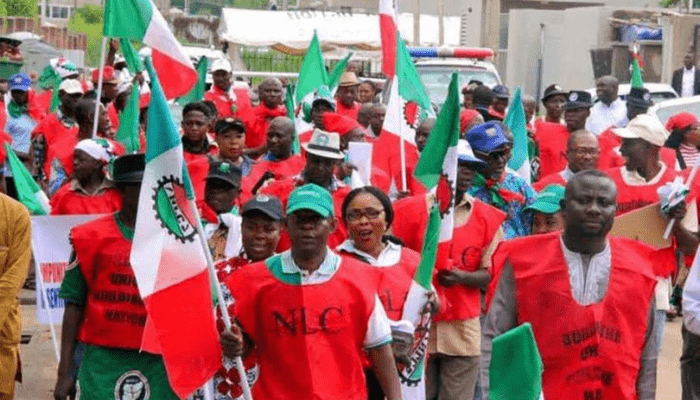By Peter Egwuatu, Asst. Business Editor, Yinka Kolawole & Nkiruka Nnorom
Experts in key sectors of the economy have cautioned that the nation risks losing N50 billion daily should Organised Labour embark on strike on Tuesday.
They were unanimous on the plight of Nigerians but warned that the timing of the industrial action would further destroy the economy.
It was particularly stated that apart from compounding the nation’s economic problems, the strike would create fear and send wrong signals to foreign investors.
They said if the action eventually takes place, the economy would come under new pressure including revenue losses.
N50bn daily losses — ASBON
Expressing fears over the likely impact of the strike, President, Association of Small Business Owners of Nigeria, ASBON, Dr. Femi Egbesola, said the action would make investors lose confidence in the economy and shut funding opportunities to Small and Medium Enterprises, SMEs.
He added that based on previous assumptions from the Nigeria Bureau of Statistics, NBS, the strike action may lead to an estimated daily loss of N50 billion to the economy.
Egbesola stated: “Whenever there is a strike in Nigeria, businesses are shut down, government offices are closed and work is brought to a total halt. The whole country is brought to a standstill, businesses lose money and workers stay at home.
“The all-round effect of such strikes hurts the growth of the national economy. Business owners find it practically impossible to meet their financial obligations such as loan repayments and prompt delivery of goods and services to clients. Hence, more bad loans and customer dissatisfaction are recorded. Investors lose confidence in the economy and shut funding opportunities to SMEs.
“In the final analysis, our Gross Domestic Product, GDP, nosedives, inflation rate jumps further, forex becomes more scarce, pushing up exchange rates, cost of living increases, more jobs are lost, vices and crimes shoot up, poverty goes up and the masses lose further confidence in government and governance.
“In some cases, lives will be lost due to violence and accidents caused by protests and more importantly, due to the closure of public hospitals and her medical personnel.
“Based on former assumptions of the Nigeria Bureau of Statistics (NBS) on previous strike actions, an estimated loss of N50 billion may be recorded daily.
These estimates do not capture secondary level costs, such as employment opportunities lost and others.”
It will dent investors’ confidence —Egbomeade
On his part, Business Analyst and Communications expert at ID Africa, Clifford Egbomeade, said: “Strikes inherently disrupt economic activities by causing businesses to temporarily cease operations or operate at limited capacity due to employee absenteeism.
Major sectors like manufacturing, transportation, and services may experience interruptions, resulting in decreased productivity and economic output. For a nation like Nigeria, where businesses have already grappled with economic challenges, this strike could exacerbate the current hardship in the country.
”The action, if undertaken, can dent investors’ confidence, both foreign and domestic, potentially leading to a slowdown in Foreign Direct Investment, FDI. This, in addition to the depreciation of the Naira, could destabilise financial markets.”
“It will have positive impact —Teriba
However, a frontline economist and CEO of Economist Associate, EA, Dr. Ayo Teriba, on the other hand, argued that the impact of the proposed strike could be positive on the economy.
He said: “Any discussion on the possible effect of the strike on Nigeria now will be speculative.”
Going further, he said: “I don’t think that labour going on strike will destroy the economy. They are going on strike to press home demands for the betterment of the lot of the workforce. If that strike happens and it succeeds in getting government to improve the condition of the workforce, it will be positive for the economy.
“In a nutshell, the strike may not hold, if it holds, it may not be effective and if it’s effective, it will be positive. It may be positive for the economy.”
It creates fear, sends wrong signals — Oni
Also commenting, Chartered Stockbroker and CEO, Sofunix Investment and Communications, Sola Oni, said: “Labour unrest is one of the means by which workers demand favourable terms and conditions of employment.
Collective bargaining often ends in a strike when labour demand is impossible for the government to implement.
”Strike comes with a cost to the economy. It often leads to total breakdown of law and order when it is hijacked by hoodlums.”
Strike at this time is not good for the economy — Olayinka
Also speaking, CEO, Wyoming Capital and Partners, Tajudeen Olayinka, said: “National strike by workers at this time is not good for the Nigerian economy. Depending on whether workers in sensitive sectors of the economy join the strike or not, the result could be catastrophic. People who live on daily sustenance will suffer avoidable hardship due to loss of daily income.
Workers who are likely to join the strike are not exempted from negative economic impact.
Real sector businesses will suffer huge losses from the avoidable shutdown of factories and unplanned inventories. Debtors will suffer the excruciating pain of having to pay huge interest on loans for days out of business. There will be a general loss to the economy.
I think it is in the interest of workers and government to avert the impending strike.
Economy is in shambles, and this is not the time to further pull it down. The ongoing economic reforms are necessary, and labour leaders must be ready to show understanding, by entering into a meaningful dialogue with government.
Similarly, Executive Vice Chairman at HIGHCAP Securities Limited, David Adonri, said: “Labour crisis, added to economic crisis, is like adding fuel to fire. Labour is an essential factor that must be mobilised with other resources to repair the badly damaged economy.
The economy right now cannot finance imports as Nigerian Letters of Credit are being dishonoured. The implication is that very soon, forex shortage will spread to essential commodities shortage.
If due to labour crisis, domestic factors cannot be fully mobilized to produce substitutes for imported goods, economic collapse may be imminent. “
Impact depends on level of compliance — Akinloye Ayorinde
Also, Economic and Investment Strategist, Akinloye Ayorinde, expressed caution on the impact of the impending strike, saying it would depend on the level of compliance by the labour unions and affiliated members.








